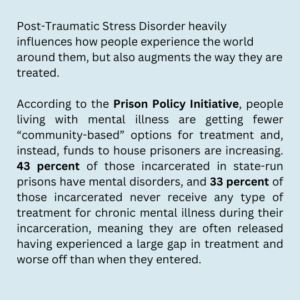Client Focus: Robbie’s Journey of Healing and Advocacy
Imagine being released from prison after 20 years of incarceration and immediately having to navigate a web of systems to obtain important documentation that proves your identity. Next, you could need to apply for housing, a job, and any benefits you may be eligible for, like Medicare, Social Security, and SNAP.
That was Robbie’s* reality. As a Black man who grew up in a low-income area, Robbie’s lived experience left him with a great deal of trauma – trauma and isolation that were only amplified while he was incarcerated.

Data from the Prison Policy Institute
Robbie first met our team in May of 2023 at the Harold Washington Library, one of Legal Council’s partner sites. He was frustrated and felt like he was running out of options after working with a law firm left him feeling like a case, not an individual. Most of his goals mirror the dignity we all seek: obtaining income and housing but also chipping away at the cycle of trauma and violence that plagued him and his community.
However, navigating systems while dealing with trauma is not a simple process. Having worked with hundreds of clients experiencing significant trauma, Kate Miller (she/he), a Senior Legal Advocate with our Homeless Outreach Program, understands this well. She collaborated with Robbie using Legal Council’s approach to help overcome systemic barriers while achieving his goals. “We apply a trauma-informed lens to our client services,” said Kate. “It acknowledges the broader set of challenges our clients face by listening for deep understanding beyond their immediate advocacy needs and goals,” she continued.
Legal Council’s approach is an intersectional one, fighting for the elimination of all unjust health disparities. This was paramount in Robbie’s case considering the systemic barriers he faced during reentry. Wait times at the Social Security Administration (SSA), even for so much as a call back from a representative, are longer now than ever and, for Robbie, this unfortunately meant losing his placement in rapid re-housing while waiting to hear back from SSA on his benefits eligibility. To prevent these types of delays and prevent clients like Robbie from losing housing, Legal Council staff are working diligently on systemic changes to the Administration’s policies and procedures that will reduce deadly wait times. And Kate was just as persistent in her individual advocacy, regularly calling the Administration for timeline updates and keeping Robbie informed.
Robbie’s history and mental health challenges—born out of distress—often manifested in paranoia, and he was deeply uncomfortable meeting in enclosed office spaces. Throughout representation, Kate met and worked with Robbie in parks, cafes, and restaurants in his neighborhood, using trauma-informed advocacy skills to build trust in a way other legal institutions often cannot.
In August of 2024, Robbie was moved into permanent housing through our partners at All Chicago and received his decision from SSA. In addition to regular monthly benefits, Robbie was eligible for over $20,000 in backpay. Now housed and no longer in the constant state of crisis that is homelessness, Robbie is passionate about giving back—he currently serves on a client advisory board with All Chicago to provide direct feedback on housing and benefits programs, using his experience navigating systemic barriers to help others.
Robbie’s story, instead of highlighting the type of legal services Legal Council provides, emphasizes the importance of how we provide them. Out Homeless Outreach Program regularly meets people like Robbie—those who have been ignored and abused by larger systems—for whom the style and structure of representation poses a huge barrier to care. Legal Council’s practice of trauma-informed advocacy recognizes and respects intersectional identities and historical trauma, treating our clients as complex and unique humans, not just cases.
For resources to help people experiencing Homelessness in the Chicagoland area read our recent Homelessness Awareness Month blog.
* Names have been changed to protect client confidentiality.


